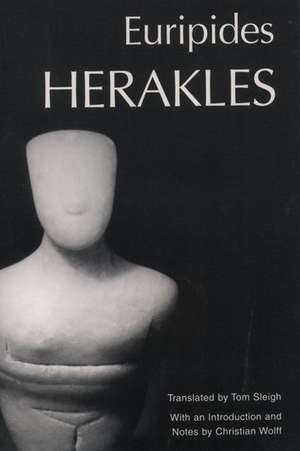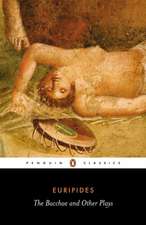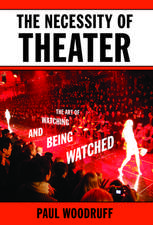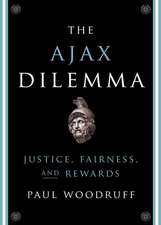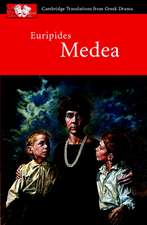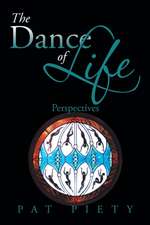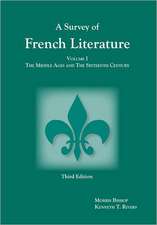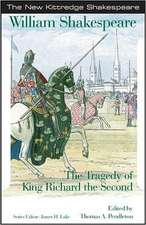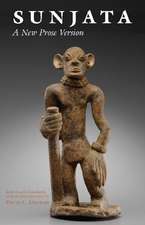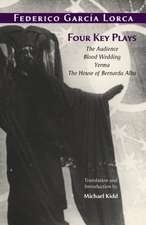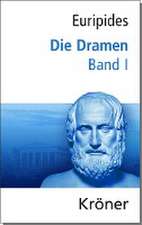Euripides: Herakles: Greek Tragedy in New Translations
Autor Euripides Traducere de Thomas Sleigh, Christian Wolffen Limba Engleză Paperback – 18 ian 2001
| Toate formatele și edițiile | Preț | Express |
|---|---|---|
| Paperback (4) | 86.31 lei 31-38 zile | |
| Hackett Publishing Company – 14 mar 2011 | 96.92 lei 3-5 săpt. | |
| Oxford University Press – feb 2001 | 86.31 lei 31-38 zile | |
| Oxford University Press – 18 ian 2001 | 140.23 lei 31-38 zile | |
| Oxford University Press – mai 1999 | 160.44 lei 31-38 zile | |
| Hardback (1) | 453.20 lei 3-5 săpt. | |
| Oxford University Press – mai 1999 | 453.20 lei 3-5 săpt. |
Din seria Greek Tragedy in New Translations
-
 Preț: 85.91 lei
Preț: 85.91 lei -
 Preț: 79.33 lei
Preț: 79.33 lei -
 Preț: 76.65 lei
Preț: 76.65 lei -
 Preț: 76.67 lei
Preț: 76.67 lei -
 Preț: 88.77 lei
Preț: 88.77 lei -
 Preț: 77.29 lei
Preț: 77.29 lei - 18%
 Preț: 48.74 lei
Preț: 48.74 lei -
 Preț: 87.77 lei
Preț: 87.77 lei - 5%
 Preț: 148.26 lei
Preț: 148.26 lei -
 Preț: 89.37 lei
Preț: 89.37 lei -
 Preț: 95.83 lei
Preț: 95.83 lei -
 Preț: 73.58 lei
Preț: 73.58 lei - 8%
 Preț: 98.18 lei
Preț: 98.18 lei - 6%
 Preț: 76.07 lei
Preț: 76.07 lei -
 Preț: 70.50 lei
Preț: 70.50 lei - 14%
 Preț: 75.80 lei
Preț: 75.80 lei - 6%
 Preț: 86.31 lei
Preț: 86.31 lei - 14%
 Preț: 78.18 lei
Preț: 78.18 lei - 14%
 Preț: 108.28 lei
Preț: 108.28 lei - 13%
 Preț: 63.24 lei
Preț: 63.24 lei - 8%
 Preț: 90.84 lei
Preț: 90.84 lei - 8%
 Preț: 140.48 lei
Preț: 140.48 lei - 16%
 Preț: 84.47 lei
Preț: 84.47 lei - 10%
 Preț: 137.12 lei
Preț: 137.12 lei - 15%
 Preț: 181.65 lei
Preț: 181.65 lei - 14%
 Preț: 68.87 lei
Preț: 68.87 lei - 11%
 Preț: 135.86 lei
Preț: 135.86 lei - 18%
 Preț: 71.23 lei
Preț: 71.23 lei -
 Preț: 89.83 lei
Preț: 89.83 lei -
 Preț: 87.59 lei
Preț: 87.59 lei - 6%
 Preț: 75.36 lei
Preț: 75.36 lei - 13%
 Preț: 332.30 lei
Preț: 332.30 lei -
 Preț: 88.48 lei
Preț: 88.48 lei -
 Preț: 88.04 lei
Preț: 88.04 lei - 6%
 Preț: 83.85 lei
Preț: 83.85 lei - 10%
 Preț: 497.48 lei
Preț: 497.48 lei - 7%
 Preț: 189.40 lei
Preț: 189.40 lei
Preț: 140.23 lei
Preț vechi: 152.44 lei
-8% Nou
Puncte Express: 210
Preț estimativ în valută:
26.84€ • 27.98$ • 22.30£
26.84€ • 27.98$ • 22.30£
Carte tipărită la comandă
Livrare economică 10-17 martie
Preluare comenzi: 021 569.72.76
Specificații
ISBN-13: 9780195131161
ISBN-10: 0195131169
Pagini: 128
Dimensiuni: 140 x 216 x 7 mm
Greutate: 0.17 kg
Editura: Oxford University Press
Colecția OUP USA
Seria Greek Tragedy in New Translations
Locul publicării:New York, United States
ISBN-10: 0195131169
Pagini: 128
Dimensiuni: 140 x 216 x 7 mm
Greutate: 0.17 kg
Editura: Oxford University Press
Colecția OUP USA
Seria Greek Tragedy in New Translations
Locul publicării:New York, United States
Recenzii
this translation merits serious thought for classroom and even scholarly use. Of particular interest is Segal's extensive reconstruction of the lacunae that mar the end of the Bakkhai, including the so-called compositio membrorum of Pentheus.
Gibbons ... has crafted a lyrical verse translation that displays an evident understanding of and respect fo the source text.
This is a lovely, thoughtful edition of the play, and between Gibbon's sturdy verse and Segal's sensitive notes, one can hardly go wrong in assigning the text to an introductory literature class. And even more advanced students of Greek tragedy will wish to examine Segal's valuable appendix on the compositio membrorum, a succinct and insightful bit of scholarship in its own right.
Gibbons ... has crafted a lyrical verse translation that displays an evident understanding of and respect fo the source text.
This is a lovely, thoughtful edition of the play, and between Gibbon's sturdy verse and Segal's sensitive notes, one can hardly go wrong in assigning the text to an introductory literature class. And even more advanced students of Greek tragedy will wish to examine Segal's valuable appendix on the compositio membrorum, a succinct and insightful bit of scholarship in its own right.
